
Summer Will End
Today’s song is the first track from KINO’s final album, released following the tragic death of Viktor Tsoi, who, fortunately, had already recorded the vocal tracks at the time of his accident. This classic album was entitled The Black Album (Чёрный альбом) in honor of Tsoi.
The Time of Little Bells
While certainly not the most popular hit of the Soviet rock movement, Bashlachyov's "The Time of Little Bells" is arguably the most important, and one of the most well-written — metaphorically dense, historically complex, and rich in vernacular speech.
He Saw the Sun
Letov was a master of appropriating Soviet symbols and rhetoric and turning them on their head. For example, when he sings of "a long and happy life" or "everything's going according to plan," he does so with bitter irony. Today's song is an impressionistic description of a shattered prison landscape, and is suggestive of an escape.
Swan Steel
Right alongside Tsoi in the pantheon of classic Russian rock figures is Boris Grebenshchikov, whose band Akvarium (or, Aquarium) has been active since 1972 and have a gigantic catalogue of albums. He is so well-known, and his last name such a mouthful, that he is typically referred to simply as БГ ("beh-geh").
Blood Type
This is the wall of Viktor Tsoi in central Moscow, on Arbat Street (Old Arbat), where fans are always leaving new graffiti inscriptions in his honor — many of them taken from his lyrics. At the very bottom, in blue, you can see a paraphrase from today’s song: “Я не останусь в этой траве” (I won’t remain in this grass).
In the Final Autumn
Today's song is a reflection on historical change and its relation to the fate of the individual, as well as the question of whether poets have any truths to reveal to us in this regard. In fact, DDT first performed this song in 1990, when sweeping historical change was underway…
What was that song in “Chernobyl?”
Episode 4 of the miniseries featured a song sung entirely in Russian, with no subtitles. While considered a folk song, and therefore somewhat vague in origin, it is strongly associated with the Cossack forces in the Caucasian War (1817-1864) — the Russian Empire's invasion and annexation of the Caucasus.







